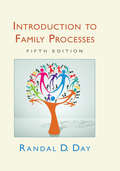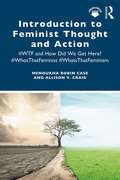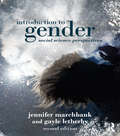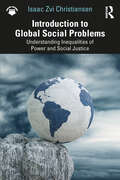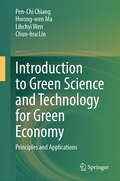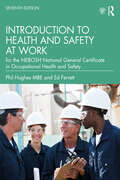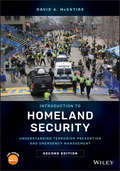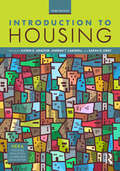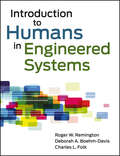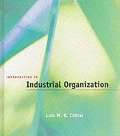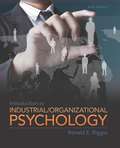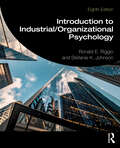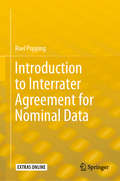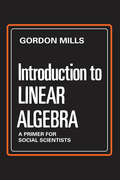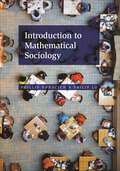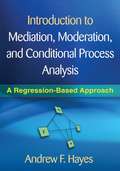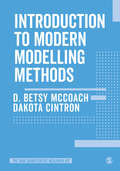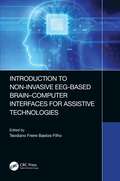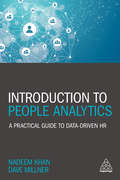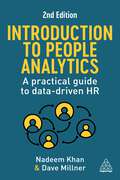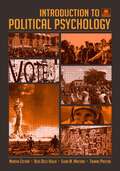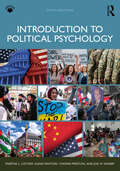- Table View
- List View
Introduction to Family Processes: Fifth Edition
by Randal D. DayWhat goes on "behind closed doors" in families is examined in this text. Through his storytelling style, Randy Day introduces readers to the family processes approach – the strategies and behaviors families use to achieve goals. The emphasis is on how families work and interact rather than on the psychological, sociological, or economic processes. It examines emotions in families, communication, relationship formation/dissolution, family rituals, and power and conflict. Chapters open with a Preview and conclude with a Summary, Study Questions, Key Terms, and Suggested Readings. Principle Boxes highlight key concepts and a Glossary defines the key terms listed at the ends of the chapters. Significantly updated with 50% new material including many new references and examples, the new edition features: A new chapter that introduces the discipline’s methodology A new chapter on relationship formation including partner selection, falling in love, commitment, sexuality, passion, and intimacy A new design reformatted to tie in with the book’s website at http://www.psypress.com/family-processes which now contains the Chapter Activity Questions that reinforce critical thinking skills, the Journal Activities that strengthen students' personal connection to the material, and the chapter Previews and Key Terms for review purposes An Instructor’s Web Resource at http://www.psypress.com/family-processes with small group and in-class exercises, lecture outlines in PowerPoint, topics for debate, suggested films, and multiple-choice, true/false, matching, and essay questions More material on the role of gender, power, genetics, and personality in relationships; families from diverse cultural and ethnic backgrounds and the impact of work and technology on the family; the changing nature of family structures including single parenting and gay unions; and stresses in family life. Written for undergraduate courses on family processes, family dynamics, family life, the family, and/or marriage & family interaction taught in family studies, human development, psychology, sociology, social work, education, consumer sciences, home economics, health, and nursing departments, this book also appeals to those who want to maximize the positive parts of family life and manage the inevitable challenges.
Introduction to Feminist Thought and Action: #WTF and How Did We Get Here? #WhosThatFeminist #WhatsThatFeminism
by Menoukha Robin Case Allison V. CraigIntroduction to Feminist Thought and Action is an accessible foundation that whets appetite for further study. It provides a non-US-centric introduction to gender studies, covering topics like 19th-century African, Chinese, and Arab movements, and foregrounds Black and Indigenous feminisms. Several case studies—the Aztecs and the Spanish, Agriculture and Gender, Beauty and Authority, Racial Stereotypes, and US Voting Rights—reveal how the interconnected architecture of privilege and oppression affects issues like globalization, media, and the environment. Feminist theories about race, sexuality, class, disabilities, and more culminate in step-by-step instructions for applying intersectionality and practicing activism. Rich with 19 diverse first-person voices, it brings feminism to life and lives to feminism.
Introduction to Gender: Social Science Perspectives
by Gayle Letherby Jennifer MarchbankThoroughly updated in this second edition, Introduction to Gender offers an interdisciplinary approach to the main themes and debates in gender studies. This comprehensive and contemporary text explores the idea of gender from the perspectives of history, sociology, social policy, anthropology, psychology, politics, pedagogy and geography and considers issues such as health and illness, work, family, crime and violence, and culture and media. Throughout the text, studies on masculinity are highlighted alongside essential feminist work, producing an integrated investigation of the field. Key features: A thematic structure provides a clear exploration of each debate without losing sight of the interconnections between disciplines. World in focus boxes and international case studies offer a broad global perspective on gender studies. In-text features and student exercises, including Controversy, A critical look and Stop and think boxes, allow the reader to engage in the debates and revise the material covered. Hotlinks throughout the text make connections between chapters, allowing the reader to follow the path of particular issues and debates between topics and disciplines. New to the second edition: A new chapter explores gender through the discipline of philosophy. A new section on international relations brings this relevant topic into focus. Current discussion on the language of gender across Europe is brought in to Chapter 1. A focus on Europe and Scandinavia as well as the UK gives the text a broader scope. Examples are updated throughout to ensure the text is cutting-edge and relevant. Introduction to Gender, second edition is highly relevant to today’s students across the social sciences and is an essential introduction for students of sociology, women’s studies and men’s studies.
Introduction to Global Social Problems: Understanding Inequalities of Power and Social Justice
by Isaac Zvi ChristiansenIntroduction to Global Social Problems introduces undergraduate students to national and international social problems from a critical sociological perspective. Isaac Zvi Christiansen presents clear descriptions of each social problem, explains key concepts, and provides students with the relevant theoretical tools needed to grasp the interconnected nature of these phenomena.This volume covers significant and interconnected issues. The book begins with an explanation of how corporate interests distort the depiction of social problems. Chapters 2 and 3 provide empirical explorations of poverty and inequality on national and global scales, together with clear and accessible expositions of relevant sociological theories. Chapter 4 examines health and educational inequalities exacerbated by the economic inequalities discussed in Chapters 2 and 3. Chapter 5 introduces students to issues of racial inequalities in the United States and abroad, while Chapter 6 takes a comparative approach to examining crime and criminal justice. Chapter 7 examines modern-day imperialism and war, with special attention given to the military industrial complex, and a brief review of US interventions around the world in the twentieth and twenty-first centuries. Chapter 8 examines politics and human rights, including a critical, historical, and sociological analysis of Israeli settler-colonialism and successive US/Israeli assaults on Gaza. The book closes with an examination of population and the environment, with special attention given to climate change, and the pressing contradictions between capitalism and the environment.This textbook will be a vital resource for introductory students across the social sciences, especially in sociology, political science, and global studies. It provides critical wraparound coverage of the momentous, embedded social problems that interconnect across social, national, and regional boundaries.
Introduction to Green Science and Technology for Green Economy: Principles and Applications
by Pen-Chi Chiang Hwong-wen Ma Lihchyi Wen Chun-hsu LinThis book focused specifically on the newly emerging issues related to the development of green science/technology, and green economy toward Sustainable Development Goals (SDGs). It covers three parts, namely (1) socioeconomic science, (2) environmental science, and (3) development of green technology and economy, each consisting of five to six chapters. The topics covered are meant not only to introduce the basic concepts of green science and technology related to the development of green economy, but also address the challenges, policy instruments, international initiatives and prospective and perspective. More importantly, it presents several innovative idea, indicators and methodologies regarding the measurement of industrial transformation, resource efficiency, green competitiveness, and green trade. To facilitate research innovation/integration and meet the needs for comprehensive education on sustainable development, the book covers a wide range of sectors of major concern in the development of green technology and economy, including green energy, green transportation, green building, green agriculture, and green tourism. The book also features innovation technology and integrated management pervasively adopted worldwide and several unanimous case studies. This book serves a wide range of readers from students, researchers, engineers, policy makers, and entrepreneurs with the emerging challenges, new concepts, innovative methodologies, and integrated strategies it provides. The insights shared from the case studies are also illustrative and inspiring.
Introduction to Health and Safety at Work: for the NEBOSH National General Certificate in Occupational Health and Safety
by Ed Ferrett Phil Hughes MBEIntroduction to Health and Safety at Work covers the fundamentals of occupational safety and health for the thousands of students who complete the NEBOSH National General Certificate in Occupational Health and Safety each year. This seventh edition closely follows the NEBOSH National General Certificate syllabus which was updated in 2019 and comes into use in 2020. The highly illustrated content covers all of the essential elements of health and safety management, the legal framework, risk assessment and control standards and also includes checklists, report forms and record sheets to supplement learning. It also has an extensive summary of current health and safety legislation. • Aligned to the NEBOSH National General Certificate in Occupational Health and Safety • Practice questions and answers to test knowledge and increase understanding • Complete with a companion website containing extra resources for tutors and students The book is suitable for all students following a level 3 Health and Safety course and a source of reference and guidance for managers at work in the UK. Written by renowned authors, this book is often provided as part of the Certificate course and is essential reading for a student.
Introduction to Health and Safety at Work: for the NEBOSH National General Certificate in Occupational Health and Safety
by Ed Ferrett Phil Hughes MBEIntroduction to Health and Safety at Work covers the fundamentals of occupational safety and closely follows the NEBOSH National General Certificate syllabus which was updated in 2019 and came into use in 2020.Highly illustrated and over 600 pages in length, it covers all of the essential elements of health and safety management, the legal framework, risk assessment and control standards and also includes checklists, report forms and record sheets to supplement learning. It also has an extensive summary of current health and safety legislation. Aligned to the NEBOSH National General Certificate in Occupational Health and Safety Practice questions and answers to test knowledge and increase understanding In addition to helping students study for the NGC, it is used for reference and revision on other Health and Safety qualifications at level 3 and above, including the Nebosh Diploma. It is also a source of reference and guidance for health and safety practitioners in the workplace.
Introduction to Homeland Security: Understanding Terrorism Prevention and Emergency Management
by David A. McEntireIntroduces readers to the world of homeland security and provides them with up-to-date information on recent attacks, new terrorist threats, visible terrorist organizations, current dilemmas, updated research, and best practices This book provides comprehensive coverage of issues relating to terrorism, terrorist behavior, homeland security policies, and emergency management. It offers a foundation that spans the readily apparent chasm between the homeland security and disaster communities, and covers the stages of emergency management with a focus on terrorism prevention and response. Based on both the academic literature and practical understanding, the book includes research findings, covering theory and principles as well as their application. Introduction to Homeland Security: Understanding Terrorism Prevention and Emergency Management, Second Edition teaches how to define homeland security, understand how it changed after 9/11, and explore its relationship with emergency management; recognize the causes of terrorism and what prompts people to engage in terrorist attacks; assess the trade-offs between security and rights, and understand how terrorism exploits the tension between these two priorities; work to prevent terrorist attacks through intelligence gathering, by promoting laws that prohibit terrorism, and by protecting borders and various sectors of society; prepare for a terrorist attack by creating an advisory council, passing ordinances, acquiring monetary resources, and establishing an EOC; effectively respond to a terrorist attack through the many functions involved, including the protection of first responders and the decontamination of the victims; recover from a terrorist attack through both short-term and long-term measures; anticipate the current challenges faced in homeland security; and comprehend the various types of attacks that might take place in the future. The second edition: Covers the four traditional phases of emergency response, with a focus on terrorism prevention and infrastructure protection Includes new content such as recent domestic and international terrorist attacks including the attacks in Paris and Boston Has a strong "practitioner" approach and draws upon a solid foundation of academic literature in the field Discusses the roles and responsibilities of government agencies, non-government organizations, and individual citizens Introduction to Homeland Security is an excellent book for all scholars, students, and practitioners interested or involved in homeland security and emergency management.
Introduction to Housing
by Katrin B. AnackerThis foundational text on housing tenure, housing policy, homelessness, and housing in a global context has been thoroughly updated to reflect changes in the United States during and after the COVID-19 pandemic. This third edition delves into the complexities of housing and related issues, to provide a deep understanding of housing’s relationship to national economic factors and housing policies. It features individual chapters authored by experts in the field, offering insights into the physical, social, psychological, economic, and policy dimensions affecting the current housing landscape both in the United States and internationally, while proposing solutions to the challenges presented. This book will appeal to faculty and students in a variety of housing- related courses, and is an essential resource for housing researchers, policymakers, and practitioners.
Introduction to Human Factors and Ergonomics, Fifth Edition
by R S BridgerErgonomics and human factors impact how humans interact with the world around them. Understanding these factors can be difficult. To cut through the tricky aspects of the subject, this bestselling textbook offers a comprehensive and up-to-date introduction to the field. This title places the subject matter into a system context using a human-machine model to structure the chapters and a knowledge application model to structure the organisation of material in each chapter.Every chapter covers Core Concepts, Basic Applications, Tools and Processes, and System Integration issues regardless of topic. This updated fifth edition provides new material on current occupational health issues such as obesity, menopause, and other modern work-related medical concerns. Updated to include coverage of new technological developments such as self-driving cars, exoskeletons, AI, hybrid working and cell phone ergonomics. Examples where tools are used including the Strain Index and the Lifting Fatigue Failure Tool have been fully updated, featuring signposting to additional resources and toolkits. Readers will grasp a full and thorough grounding in the need-to-knows of ergonomics and human factors.Introduction to Human Factors and Ergonomics, Fifth Edition is the premier textbook for any student where ergonomics and human factors play a part in their discipline, including those in aviation, medicine and healthcare, energy, engineering, health and safety and the sciences.Also included in this updated new edition are an instructor’s manual and a guide to tutorials and seminars. Over 500 PowerPoint slides are available for academic use from the publisher.
Introduction to Humans in Engineered Systems
by Charles L. Folk Roger Remington Deborah A. Boehm-DavisFully up-to-date coverage of human factors engineering-plus online access to interactive demonstrations and exercisesEngineering accomplishments can be as spectacular as a moon landing or as mundane as an uneventful drive to the local grocery store. Their failures can be as devastating as a plane crash or a massive oil spill. Over the past decade, psychologists and engineers have made great strides in understanding how humans interact with complex engineered systems-human engineering. Introduction to Humans in Engineered Systems provides historical context for the discipline and an overview of some of the real-world settings in which human engineering has been successfully applied, including aviation, medicine, computer science, and ground transportation. It presents findings on the nature and variety of human-engineering environments, human capabilities and limitations, and how these factors influence system performance. Important features include:Contents organized around the interaction of the human operator with the larger environment to guide the analysis of real-world situationsA web-based archive of interactive demonstrations, exercises, and links to additional readings and tools applicable to a range of application domainsWeb content customizable for focus on particular areas of study or research
Introduction to Industrial Organization
by Luís M. B. CabralOver the past twenty years, the study of industrial organization--the analysis of imperfectly competitive markets--has grown from a niche area of microeconomics to a key component of economics and of related disciplines such as finance, strategy, and marketing. This book provides an issue-driven introduction to industrial organization. It includes a vast array of examples, from both within and outside the United States. While formal in its approach, the book is written in a way that requires only basic mathematical training. Supplemental materials posted on the Web make more extensive use of algebra and calculus.
Introduction to Industrial and Organizational Psychology
by Ron RiggioDemonstrates the connection between psychological theory and application in the field of Industrial / Organizational Psychology. Introduction to Industrial / Organizational Psychology is a student-centered, real-world driven program designed and written with the student in mind, giving examples and illustrations relevant to their world of work. The sixth edition continues to be accessible to students while maintaining a comprehensive coverage of the classical and new topics.With more student-oriented features, instructors will find this the most thoroughly referenced I/O psychology and student accessible text on the market. Learning Goals Upon completing this book, readers will be able to: * Connect psychological theory in the field of industrial/organizational psychology and apply the concepts to their everyday world of work * Be familiar with "classic" theories and research along with the latest developments and innovations in the field * Understand the overview of the world of work.
Introduction to Industrial/Organizational Psychology
by Ronald E. Riggio Stefanie K. JohnsonIntroduction to Industrial/Organizational Psychology provides a complete overview of the psychological study of the world of work. Written with the student in mind, the book presents classic theory and research in the field alongside examples from real-world work situations to provide deeper insight. This edition has been thoroughly updated to include the latest research on each key topic, and now features: A spotlight on diversity, equity, and inclusion throughout, including coverage of LGBTQIA+ inclusion and racial justice Expanded coverage of ethics in I/O psychology practice Increased emphasis on cross-cultural and international issues Coverage of the changing nature of work, post-pandemic, including remote working, worker stress, and burnout A new focus on technologies related to I/O such as virtual reality and computer adaptive testing New figures, illustrations, and charts to grab the reader’s attention and facilitate learning Accompanied by extensive student and instructor resources, it is a must read for all students on I/O psychology courses and courses in work psychology and organizational behavior, and for practicing managers who want a comprehensive overview of the psychology of work.
Introduction to Interrater Agreement for Nominal Data (SpringerBriefs in Statistics)
by Roel PoppingThis introductory book enables researchers and students of all backgrounds to compute interrater agreements for nominal data. It presents an overview of available indices, requirements, and steps to be taken in a research project with regard to reliability, preceded by agreement. The book explains the importance of computing the interrater agreement and how to calculate the corresponding indices. Furthermore, it discusses current views on chance expected agreement and problems related to different research situations, so as to help the reader consider what must be taken into account in order to achieve a proper use of the indices.The book offers a practical guide for researchers, Ph.D. and master students, including those without any previous training in statistics (such as in sociology, psychology or medicine), as well as policymakers who have to make decisions based on research outcomes in which these types of indices are used.
Introduction to Linear Algebra: A Primer for Social Scientists
by Gordon MillsThis is the first book on linear algebra written specifically for social scientists. It deals only with those aspects of the subject applicable in the social sciences and provides a thorough understanding of linear algebra for those who wish to use it as a tool in the design, execution, and interpretation of research. Linear mathematical models play an important role in all of the social sciences. This book provides a step-by-step introduction to those parts of linear algebra which are useful in such model building. It illustrates some of the applications of linear analysis and helps the reader learn how to convert his formulation of a social science problem into algebraic terms. The author covers matrix algebra, computational methods, linear models involving discrete variables, and clear, complete explanations of necessary mathematical concepts. Prior knowledge of calculus is not required since no use is made of calculus or of complex numbers. A novel feature of the mathematical content of the book is the treatment of models expressed in terms of variables which must be whole numbers (integers). The book is distinguished by a step-by-step exposition that allows the reader to grasp quickly and fully the principles of linear algebra. All of the examples used to illustrate the text are drawn from the social sciences, enabling the reader to relate the subject to concrete problems in his field. Exercises are included as a necessary part of the text to develop points not covered in the text and to provide practice in the algebraic formulation of applied problems. An appendix gives solutions (or hints) for selected exercises.
Introduction to Mathematical Sociology
by Phillip Bonacich Philip LuA comprehensive textbook on the tools of mathematical sociology and their applicationsMathematical models and computer simulations of complex social systems have become everyday tools in sociology. Yet until now, students had no up-to-date textbook from which to learn these techniques. Introduction to Mathematical Sociology fills this gap, providing undergraduates with a comprehensive, self-contained primer on the mathematical tools and applications that sociologists use to understand social behavior.Phillip Bonacich and Philip Lu cover all the essential mathematics, including linear algebra, graph theory, set theory, game theory, and probability. They show how to apply these mathematical tools to demography; patterns of power, influence, and friendship in social networks; Markov chains; the evolution and stability of cooperation in human groups; chaotic and complex systems; and more.Introduction to Mathematical Sociology also features numerous exercises throughout, and is accompanied by easy-to-use Mathematica-based computer simulations that students can use to examine the effects of changing parameters on model behavior.Provides an up-to-date and self-contained introduction to mathematical sociologyExplains essential mathematical tools and their applicationsIncludes numerous exercises throughoutFeatures easy-to-use computer simulations to help students master concepts
Introduction to Mediation, Moderation, and Conditional Process Analysis: A Regression-Based Approach (Methodology in the social sciences)
by Andrew F. HayesThis book explains the fundamentals of mediation and moderation analysis and their integration as "conditional process analysis." Procedures are described for testing hypotheses about the mechanisms by which causal effects operate, the conditions under which they occur, and the moderation of mechanisms.
Introduction to Modern Modelling Methods (The SAGE Quantitative Research Kit)
by D. Betsy McCoach Dakota CintronUsing simple and direct language, this concise text provides practical guidance on a wide range of modeling methods and techniques for use with quantitative data. It covers: · 2-level Multilevel Models · Structural Equation Modeling (SEM) · Longitudinal Modeling using multilevel and SEM techniques · Combining organizational and longitudinal models Part of The SAGE Quantitative Research Kit, this book will give you the know-how and confidence needed to succeed on your quantitative research journey.
Introduction to Modern Modelling Methods (The SAGE Quantitative Research Kit)
by D. Betsy McCoach Dakota CintronUsing simple and direct language, this concise text provides practical guidance on a wide range of modeling methods and techniques for use with quantitative data. It covers: · 2-level Multilevel Models · Structural Equation Modeling (SEM) · Longitudinal Modeling using multilevel and SEM techniques · Combining organizational and longitudinal models Part of The SAGE Quantitative Research Kit, this book will give you the know-how and confidence needed to succeed on your quantitative research journey.
Introduction to Non-Invasive EEG-Based Brain-Computer Interfaces for Assistive Technologies
by Teodiano Freire Bastos-FilhoThis book aims to bring to the reader an overview of different applications of brain-computer interfaces (BCIs) based on more than 20 years of experience working on these interfaces. The author provides a review of the human brain and EEG signals, describing the human brain, anatomically and physiologically, with the objective of showing some of the patterns of EEG (electroencephalogram) signals used to control BCIs. It then introduces BCIs and different applications, such as a BCI based on ERD/ERS Patterns in α rhythms (used to command a robotic wheelchair with an augmentative and alternative communication (AAC) system onboard it); a BCI based on dependent-SSVEP to command the same robotic wheelchair; a BCI based on SSVEP to command a telepresence robot and its onboard AAC system; a BCI based on SSVEP to command an autonomous car; a BCI based on independent-SSVEP (using Depth-of-Field) to command the same robotic wheelchair; the use of compressive technique in SSVEP-based BCI; a BCI based on motor imagery (using different techniques) to command a robotic monocycle and a robotic exoskeleton; and the first steps to build a neurorehabilitation system based on motor imagery of pedalling together an in immersive virtual environment. This book is intended for researchers, professionals and students working on assistive technology.
Introduction to People Analytics: A Practical Guide to Data-driven HR
by Nadeem Khan Dave MillnerAn understanding of people analytics is a crucial skill for all HR professionals. No longer limited to employees in data teams or those with analyst in their job titles, people analytics is now an integral part of every HR job. Introduction to People Analytics allows all HR professionals to get to grips with analytics, feel confident in their ability to handle employee and organizational data and use analytics to move from opinions to insights.From where to find data in an organization, how to collect it and analyse it through to how to use these findings to add business value, Introduction to People Analytics is essential reading for all HR professionals. With case studies and thought leadership insights from companies who have leveraged people analytics to improve culture and employee engagement, increase performance and reduce costs including NHS, Brompton Bikes, British Heart Foundation, King, Experian and AstraZeneca, FIS and Swarovski, this book shows how and where HR analytics can make a tangible difference to organizations. There is also expert guidance and practical advice on how to embed analytics into HR processes and adopt a data-driven approach to all workplace activities.
Introduction to People Analytics: A Practical Guide to Data-driven HR
by Nadeem Khan Dave MillnerHow can HR practitioners with little or no experience of analytics feel confident in their ability to find, analyse and use workforce data to make better business decisions? This book has the answers.An understanding of people analytics is a crucial skill for all HR professionals. This new edition provides expert guidance on the key aspects of analytics, enabling all HR professionals to feel confident in their ability to handle employee and organizational data. It features new material on applying data to respond to external disruption such as COVID-19 as well as how to develop a people analytics journey. There is also advice on recruiting people analytics specialists and embedding new data-driven operating models within HR.This book is essential reading for all HR professionals to develop understanding of how and where HR analytics can make a tangible difference to organizations. With updated case studies and thought leadership examples from companies including NHS, AstraZeneca and Swarovski, this book demonstrates how people analytics can be leveraged to improve culture and employee engagement, increase performance and reduce costs.
Introduction to Political Psychology
by Thomas Preston Beth Dietz Martha L. Cottam Elena MastorsThe first comprehensive textbook on political psychology, this user-friendly volume explores the psychological origins of political behavior. Using psychological concepts to explain types of political behavior, the authors introduce a broad range of theories and cases of political activity to illustrate the behavior. The book examines many patterns of political behaviors including leadership, group behavior, voting, race, ethnicity, nationalism, political extremism, terrorism, war, and genocide. Text boxes highlight current and historical events to help students see the connection between the world around them and the concepts they are learning. Examples highlight a variety of research methodologies used in the discipline such as experimentation and content analysis. The "Political Being" is used throughout to remind the reader of the psychological theories and concepts to be explored in each chapter. Introduction to Political Psychology explores some of the most horrific things people do to one another for political purposes, as well as how to prevent and resolve conflict, and how to recover from it. The goal is to help the reader understand the enormous complexity of human behavior and the significant role political psychology can play in improving the human condition.Designed for upper division courses on political psychology or political behavior, this volume also contains material of interest to those in the policymaking community.
Introduction to Political Psychology
by Thomas Preston Martha L. Cottam Elena Mastors Joe W. HusebyThis fifth edition of Introduction to Political Psychology explores the many psychological patterns that influence individual political behavior. The authors introduce readers to a broad range of theories, concepts, and case studies of political activity, arguing that individuals are driven or motivated to act in accordance with personality characteristics, values, beliefs, and attachments to groups. The book explains many aspects of political behavior—whether seemingly pathological actions or normal decision-making practices, which sometimes work optimally, and sometimes fail.Thoroughly updated throughout, the book examines patterns of political behavior in areas including leadership, group behavior, voting, race, nationalism, terrorism, and war. This edition features: Detailed coverage of political polarization, and the psychology behind it; Up-to-date topics and case studies focused on the 2024 US election, the war in Ukraine, and the Israel–Palestine conflict, as well as social movements such as climate change activism, Black Lives Matter, and #MeToo; A robust suite of timesaving support material. Accessibly written and comprehensive in scope, it is an essential companion for all graduate and upper-level undergraduate students of psychology, political science, and political psychology. It will also be of interest to those in the policy-making community, especially those looking to learn more about the extent to which perceptions, personality, and group dynamics affect the policy-making arena.
